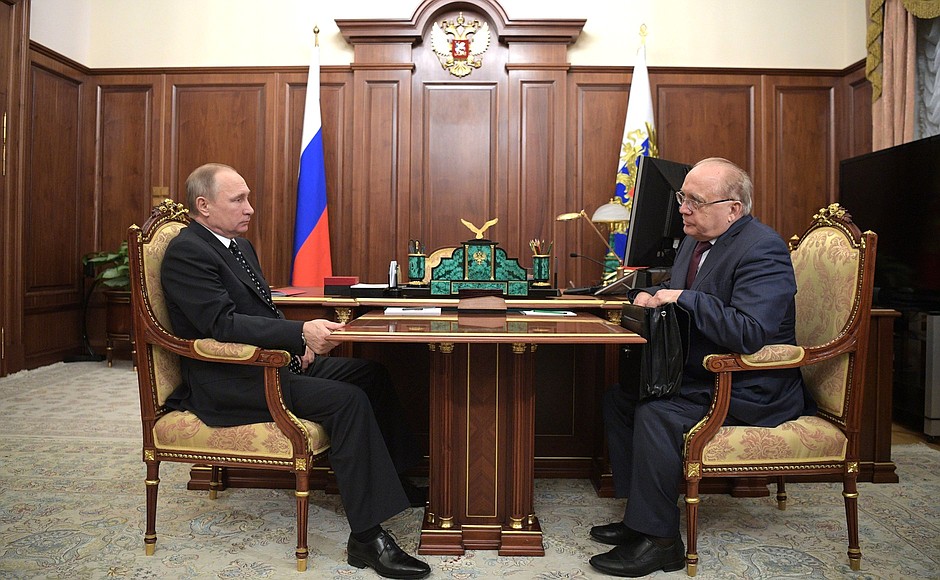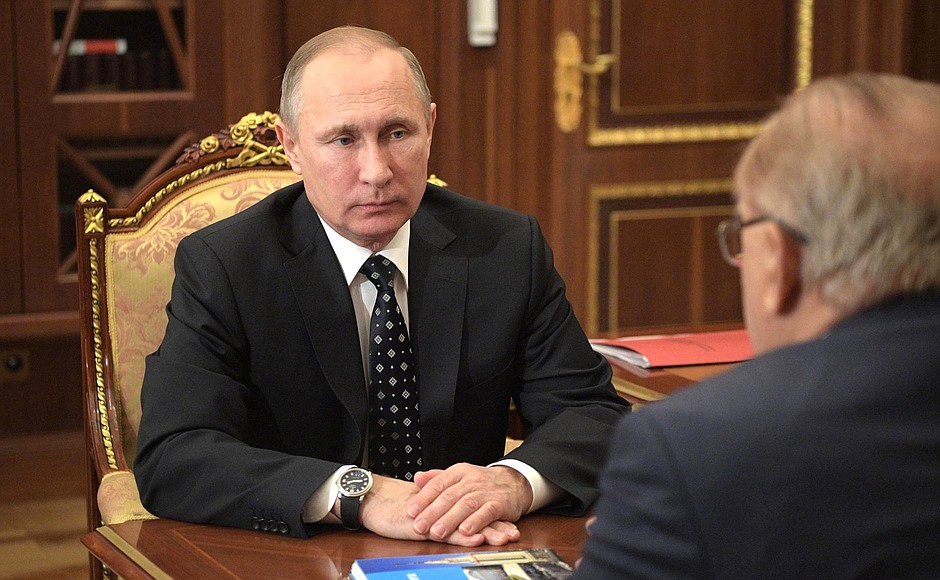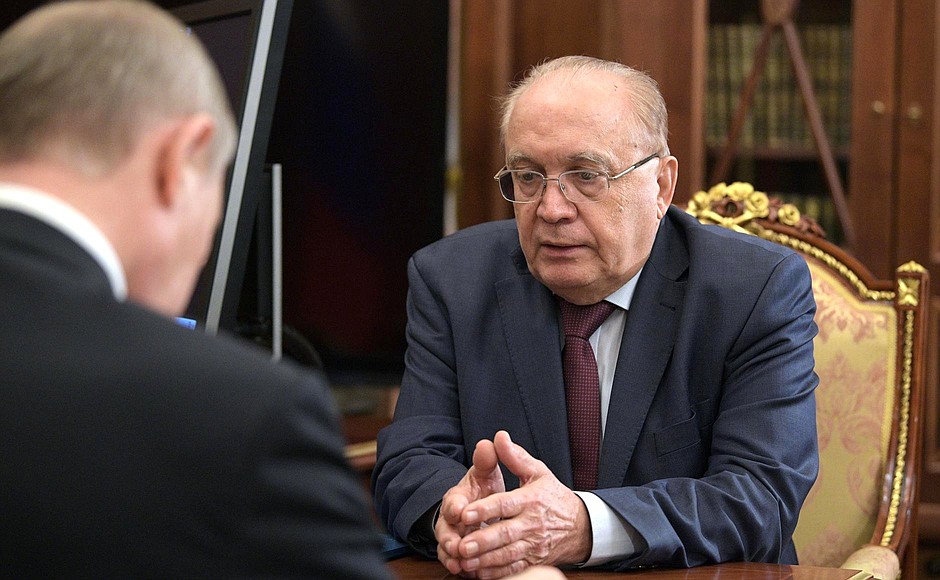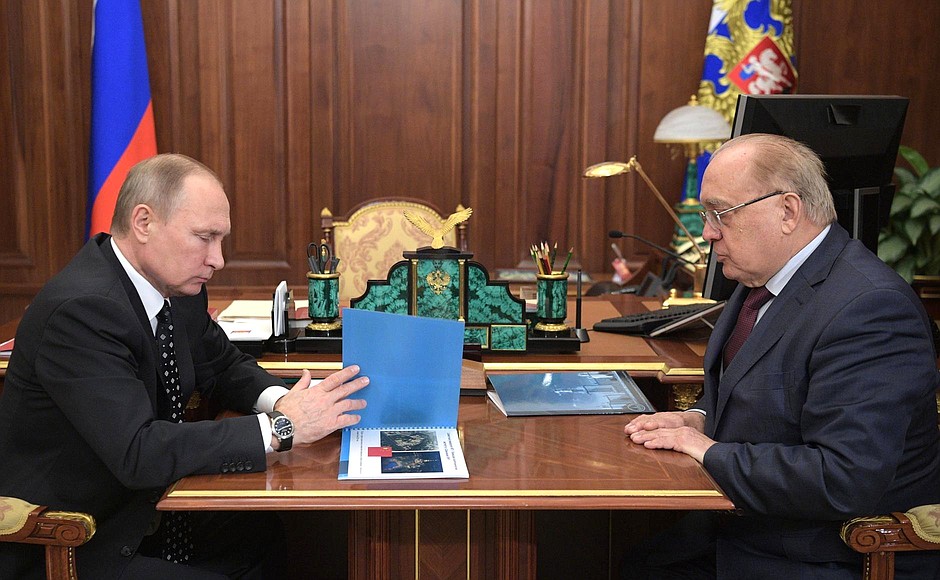President of Russia Vladimir Putin: Mr Sadovnichy, what achievements can you report in 2016?
MSU Rector Viktor Sadovnichy: Mr President, we ended 2016 with very good results. We have over 50,000 students, including 35,000 undergraduates and also post-graduates. Last year, we graduated 10,000 students, and this year we will have over 7,000 graduates, 25 percent of them A-level students.
We have completed several very good projects connected with the establishment of a University Gymnasium. We have enrolled the first group of talented young people from around Russia who have studied at the Sirius educational centre for gifted children.
We have built a campus for 3,000 students, a healthcare centre with European-class equipment, the Lomonosov and Shuvalov buildings and a library. In all, we have built 1 million square metres of floor space within five to seven years. In other words, we have implemented the development programme.
We can also report good results in research. For the first time in the history of Russian and even Soviet universities, we have been ranked third in the world by employer reputation, that is, in terms of education quality. This has never happened before: Moscow State University is now rated third in the world, after Stanford and Oxford. It is a very high ranking; we have never received it before.
Vladimir Putin: The assessment has become more objective.
Viktor Sadovnichy: It has.
Mr President, we have implemented your instructions and have created and are applying our own ranking of universities, the Moscow International Ranking. We will publish the first results, which will include foreign universities, in September – we discussed this at a meeting of the Presidential Council for Science and Education.
Vladimir Putin: What can you say about your network of branches?
Viktor Sadovnichy: We have unique branches. There are six of them. Look, these are the Lazarev Barracks in Sevastopol. We have completely renovated them. The branch opened in 1999 and now has 700 students. This is a sports centre; it has no match in southern Russia, with a 10-metre-high diving board and a swimming pool. And this is the campus and the academic buildings.
In general, we encountered great resistance when we decided to open a branch in Sevastopol back then. We were denied a licence and excluded from the local academic environment. We had to use personal contacts, getting support from local education leaders, who continue to live there. And so we saved the branch. It was once in a difficult situation, but now it is prospering.
Vladimir Putin: What is its specialty?
Viktor Sadovnichy: It has five departments: mathematics, economics, geography, the Russian language and physics.
Vladimir Putin: It sounds like a full-scale branch.
Viktor Sadovnichy: And so it is.
Or take our Astana branch, which I have recently visited. We have set up a research department there at the request of President [of Kazakhstan Nursultan] Nazarbayev, who asked me to visit. Apart from the branch, we also contribute to the work of the Presidential Centre in Astana.
This is our branch in Tashkent. It was established at the request of President [of Uzbekistan Islam] Karimov and opened in 2006.
And this is our branch in Baku, with a campus of its own. It is probably the best university in Azerbaijan. It has six departments and 500 students, the republic’s future elite.
Overall, our branches have 3,000 students. It is important that tuition at our branches is in Russian, and their graduates receive MSU diplomas and find employment in their countries. In other words, we are teaching friends; we hope we are.
This is our branch in Dushanbe [Tajikistan]; it has been successfully operating since 2010.
And this is the branch we opened last year…
Vladimir Putin: In Yerevan, Armenia.
Viktor Sadovnichy: The project was supervised by the President of Armenia.
In fact, presidents sponsor all our branches, which I see as the success of our mission – I consider our work there as a mission.
This is in China. In keeping with your agreements with the Chinese leaders, we are opening a joint university in Shenzhen. Our Chinese partners want a building that would resemble the MSU building in Moscow. We had a ground-breaking ceremony and received a [teaching] licence; classes are to begin in September. It will be a joint university between MSU and the Beijing Institute of Technology, the first joint university in the history of Russian-Chinese relations.
In addition, after your visit to Slovenia, we will open a branch there as well.
We have very close ties with our Iranian partners. We have signed 37 agreements and have opened several Lomonosov Centres in Iran.
We are following the example of China’s Confucius Institute by opening Lomonosov Centres. We have them here and here…
Vladimir Putin: Yes, in Lebanon and Italy.
Viktor Sadovnichy: Yes.
<…>



